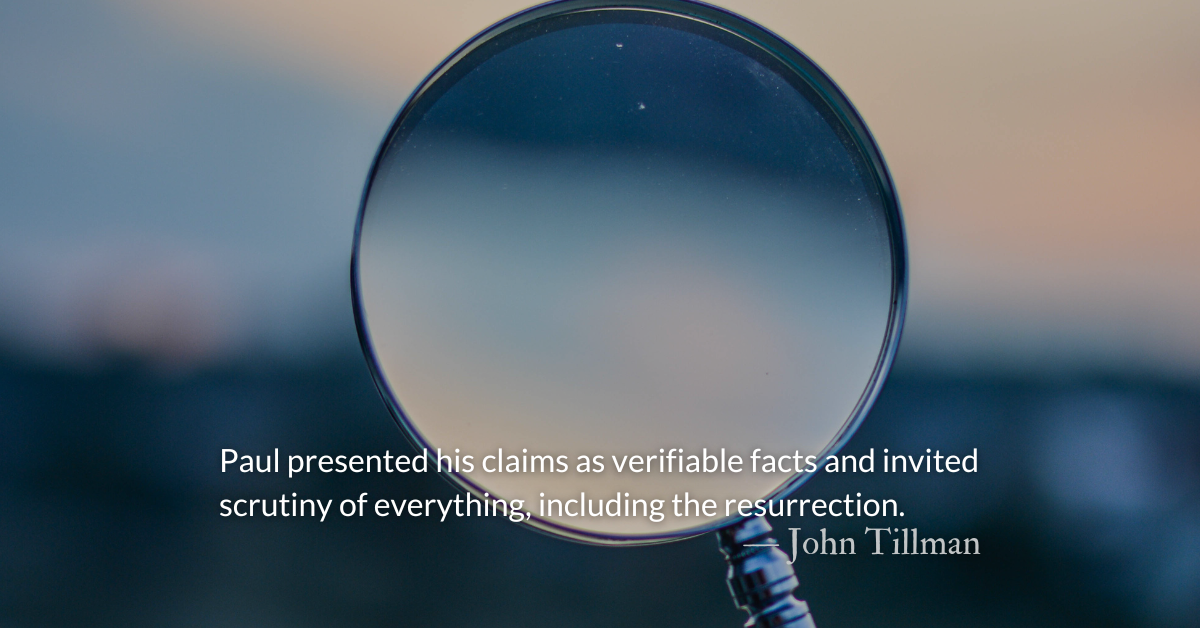Scripture Focus: Acts 25.18-19
18 When his accusers got up to speak, they did not charge him with any of the crimes I had expected. 19 Instead, they had some points of dispute with him about their own religion and about a dead man named Jesus who Paul claimed was alive.
Acts 26.24-27
24 At this point Festus interrupted Paul’s defense. “You are out of your mind, Paul!” he shouted. “Your great learning is driving you insane.”
25 “I am not insane, most excellent Festus,” Paul replied. “What I am saying is true and reasonable. 26 The king is familiar with these things, and I can speak freely to him. I am convinced that none of this has escaped his notice, because it was not done in a corner. 27 King Agrippa, do you believe the prophets? I know you do.”
Reflection: True and Reasonable Faith
By John Tillman
Festus is confused by the false charges against Paul. He didn’t even know how to describe the case when sending it to Caesar. Paul’s claims seemed like madness to him.
Many within Greek-influenced Roman culture thought the spirit was a superior form of reality and the body was an inferior shell. The resurrection of the dead was nonsense—more like a curse than a miracle. Later, as Paul spoke of resurrection during his defense, Festus would interrupt, saying, “You are out of your mind!” (Acts 26.24-27)
Paul’s defense included telling the facts of his own life, his previous persecution of “The Way,” and his meeting with the risen Jesus. Paul presented his claims as verifiable facts that “did not happen in a corner” (Acts 26.26) and invited scrutiny of everything, including the resurrection. Even in Paul’s day, all the authority and power of Rome couldn’t disprove Paul’s testimony about Jesus.
Paul’s defense also claimed that his testimony about resurrection was “reasonable” from the Jewish perspective and in light of what was written in the prophets. To Agrippa, a man well-studied in Jewish anthropology and the scriptures, the resurrection of the dead was not madness and Paul’s story apparently seemed quite compelling. (Acts 26.28)
Paul demonstrated that he was innocent of the charges against him. But what is more important is that he demonstrated that Christian claims sprang logically from promises in the Jewish scriptures and that the facts of his life merited serious consideration of his religious claims.
The TV series, The Chosen, imagines a conversation between Nicodemus and Mary Magdalene. In that scene, she says, “I was one way… and now I am completely different. And the thing that happened in between… was Him.” Even as far removed from the events of the Gospels as we are, we still can bear witness, like Paul and others did, using our own stories.
You may think, “I don’t have a dramatic story. I wasn’t arresting Christians like Paul or possessed by demons like Mary.” But surely Jesus has made a dramatic change in you? Hasn’t he changed the way you think about yourself? Hasn’t he changed the way you think about others? Hasn’t he rooted out of your heart stones and weeds and planted new growth?
Keep testifying to the truth of the resurrection and living out its implications. It is our lives, paired with our words, that make our faith “true and reasonable” to the watching world.
Divine Hours Prayer: A Reading
Jesus said: “In all truth I tell you, whoever welcomes the one I send, welcomes me, and whoever welcomes me, welcomes the one who sent me.” — John 13.20
– From The Divine Hours: Prayers for Springtime by Phyllis Tickle.
Today’s Reading
Numbers 2 (Listen 3:47)
Acts 25 (Listen 4:40)
Read more about Implore Them to Stay
Christians are engaged in evangelism by living ordinary lives and glorifying God.
Read more about A Bad Day Fishing
Peter’s first recorded words to Jesus in response the miracle are “go away.”






